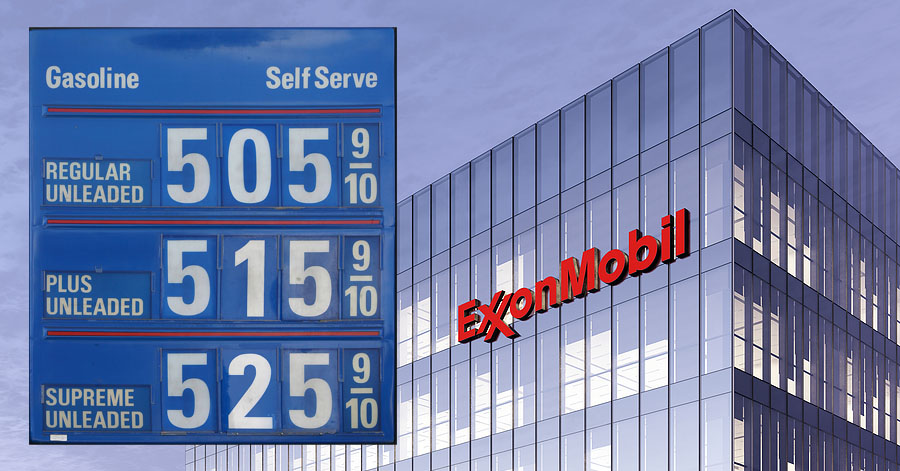OPINION
Build state’s green economy by taxing Big Oil’s windfall profits
By JOHN BURBANK
(March 16, 2022) — Who is winning the Russian war on Ukraine? Not Russia, not Ukraine. But there is already one big winner: U.S. oil companies.
Of course, these companies have been winning for a long time, but they are getting a bonus infusion of profits this month. Exxon stock price has increased 22 percent since the turn of the year. ConocoPhillips stock has increased 23 percent. Chevron has increased 33 percent! For comparison, the S&P 500 has fallen 8 percent since the beginning of the year, the Dow Jones Index has fallen 11 percent, and the NASDAQ Composite has lost 18 percent of its value. Year to year, Exxon’s net income of $8.87 billion this March was an increase of 144 percent. And that is before the Russians invaded Ukraine.
It is the absolutely right move to stop buying Russian oil. But we shouldn’t just turn a blind eye to the windfall profits this creates for U.S. oil companies, as gasoline prices go up and up. A year ago the price of a gallon of regular gas in our state was $2.86. A month ago it was $3.50. A week ago it was $4.17. As of today, it is $4.73. That is a 35 percent increase in one month.
We experienced something like this 15 years ago, in the aftermath of Hurricane Katrina, when gas prices shot up and oil companies reaped windfalls from American consumers. In response to that, then state Representative and now Senator Bob Hasegawa introduced a bill to cleverly tax excess profits of big oil and reinvest in renewable energy and energy conservation. This bill, “concerning community reinvestment of oil windfall profits,” (HB 3161, 2010), would have put in place an automatic brake on price hikes for gasoline with big disincentives and penalties on oil companies that were realizing windfall profits.
When this bill was introduced in 2010, the state’s average gasoline price was $1.75 per gallon. Adjusted for inflation, that’s equivalent to $2.28 today. If gas prices stayed at the rate, there would be no windfall profits tax. If prices went up 10 cents per gallon, the oil companies that refine and market in Washington state would pay a 2 percent tax on their profits, as these are proportioned to Washington state. If prices went up 20 cents, they would pay a 12 percent surtax, if prices went up 30 cents, they would pay a 14 percent surtax. If prices went up a dollar, the oil companies would be paying a 30 percent surtax on their profits.
Let’s start with the average price of gasoline at the beginning of this year, $3.91. Calculating HB 3161’s windfall profits tax from that point today, it would be 24 percent of profits allocated to Washington state. That would be a big disincentive to oil companies from raising prices, and if not, a strong source of revenue for our state to invest in green energy.
In 2010, the Legislature’s fiscal note predicted a $400 million revenue stream from this tax each biennium. With the way gas prices have doubled since then, our state would reap easily $500 million a year through this excess profits tax.
We could use this revenue to place solar panels on all public buildings plus any residences that want to participate in the green economy. We could also insulate these residences and public buildings, saving electricity and making us less vulnerable to climate change, summer heat and winter freezing. We could inject public investments into our own solar panel manufacturing in the state, making us less vulnerable to global disruptions of the supply system. We could make up for the Legislature’s failure this session to expand the Working Families Tax Credit, by funding an expansion of this tax credit to insure that both low-income and middle-class families get a bit of an economic boost to enable them to keep up with inflation.
Or we could do nothing.
With the Legislature finished, there won’t be much of an appetite for a special session to pass a windfall profits tax on Big Oil. Of course, they did do this for Boeing, with a two-day session in 2013 that handed Boeing $8 billion. Perhaps the Legislature and the governor could consider a special session that would put a brake on gasoline prices, and help the people of our state with investments from a windfall profits tax on Big Oil.
Doing nothing means that gas prices will go up and up, the citizens of our state will get squeezed more and more, our earned money will flow out to the global oil giants, and we will be hard pressed to move forward investing in a green economy. A day or two of inconvenience for legislators in a special session to tackle big oil presents a much better future — for all of us.

John Burbank is the founder and former executive director of the Economic Opportunity Institute in Seattle.






